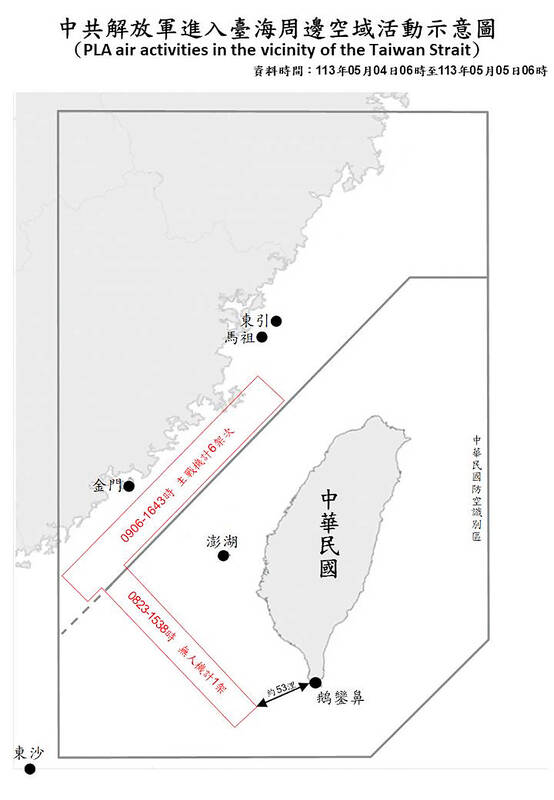Taiwan should create a military aviation law to give legal protection to its air defense identification zone (ADIZ) in counteracting Chinese People’s Liberation Army (PLA) drones, National Defense University associate professor of law and military officer Lee Yen-chang (李彥璋) said on Saturday.
The PLA has increased its efforts to compress Taiwan’s defensive area by crossing into the latter’s ADIZ with ships and aircraft including uncrewed aerial vehicles, major Yen wrote in an article published in this month’s issue of Air Force Bimonthly.
The Chicago Convention on International Civilian Aviation, which governs transnational civilian flights, neither allows nor forbids governments from staking out its ADIZs, he said.

Photo courtesy of the Ministry of National Defense
This means ADIZs have an unclear legal status in international law, and the right to self-defense inside an ADIZ is conditional, he said.
The legitimate exercise of the right to self-defense by a nation state must be an appropriate, necessary, incremental and proportional response to actions causing actual harm, instead of merely posing a military threat, Yen said.
The bounds of the nation’s ADIZ were unilaterally established by the Civil Aviation Administration and far exceed the military’s requirement for a reasonably delineated defensive zone, he said.
The military and civilian administration of the zone should have been kept separate due to differences in their purpose, even if the designated air space were identical, Yen said.
The nation did not create clear legal guidelines for the armed forces dealing with foreign aircraft to counter Beijng’s challenges to its authority, he said.
Legislating a military aviation law would address these issues and form the basis of a common standard to govern ADIZ claims in the region, Yen said.
International law is indifferent to ADIZs which are created unilaterally by national governments, Institute for National Defense and Security Research research fellow Su Tzu-yun (蘇紫雲) said.
The proposed promulgation of a military aviation law would provide Taiwanese air and air defense units with rules for handling unidentified aircraft outside the nation’s sovereign airspace, he said.
Most countries use their civil aviation laws to govern ADIZs enforcement, but Taiwanese civil aviation authorities are not sufficiently familiar with military requirements to propose legislation on the matter, he added.
Institute associate research fellow Shu Hsiao-huang (舒孝煌) said that Taiwan has to rethink the bounds of its ADIZ, which extends into the Chinese provinces of Zhejiang and Jiangxi.
These ADIZ claims might be valid in domestic law but are meaningless because they include airspace that the nation’s military aircraft cannot go into, he added.

The brilliant blue waters, thick foliage and bucolic atmosphere on this seemingly idyllic archipelago deep in the Pacific Ocean belie the key role it now plays in a titanic geopolitical struggle. Palau is again on the front line as China, and the US and its allies prepare their forces in an intensifying contest for control over the Asia-Pacific region. The democratic nation of just 17,000 people hosts US-controlled airstrips and soon-to-be-completed radar installations that the US military describes as “critical” to monitoring vast swathes of water and airspace. It is also a key piece of the second island chain, a string of

A magnitude 5.9 earthquake that struck about 33km off the coast of Hualien City was the "main shock" in a series of quakes in the area, with aftershocks expected over the next three days, the Central Weather Administration (CWA) said yesterday. Prior to the magnitude 5.9 quake shaking most of Taiwan at 6:53pm yesterday, six other earthquakes stronger than a magnitude of 4, starting with a magnitude 5.5 quake at 6:09pm, occurred in the area. CWA Seismological Center Director Wu Chien-fu (吳健富) confirmed that the quakes were all part of the same series and that the magnitude 5.5 temblor was

Taiwan will now have four additional national holidays after the Legislative Yuan passed an amendment today, which also made Labor Day a national holiday for all sectors. The Chinese Nationalist Party (KMT) and Taiwan People’s Party (TPP) used their majority in the Legislative Yuan to pass the amendment to the Act on Implementing Memorial Days and State Holidays (紀念日及節日實施辦法), which the parties jointly proposed, in its third and final reading today. The legislature passed the bill to amend the act, which is currently enforced administratively, raising it to the legal level. The new legislation recognizes Confucius’ birthday on Sept. 28, the

The Central Weather Administration has issued a heat alert for southeastern Taiwan, warning of temperatures as high as 36°C today, while alerting some coastal areas of strong winds later in the day. Kaohsiung’s Neimen District (內門) and Pingtung County’s Neipu Township (內埔) are under an orange heat alert, which warns of temperatures as high as 36°C for three consecutive days, the CWA said, citing southwest winds. The heat would also extend to Tainan’s Nansi (楠西) and Yujing (玉井) districts, as well as Pingtung’s Gaoshu (高樹), Yanpu (鹽埔) and Majia (瑪家) townships, it said, forecasting highs of up to 36°C in those areas